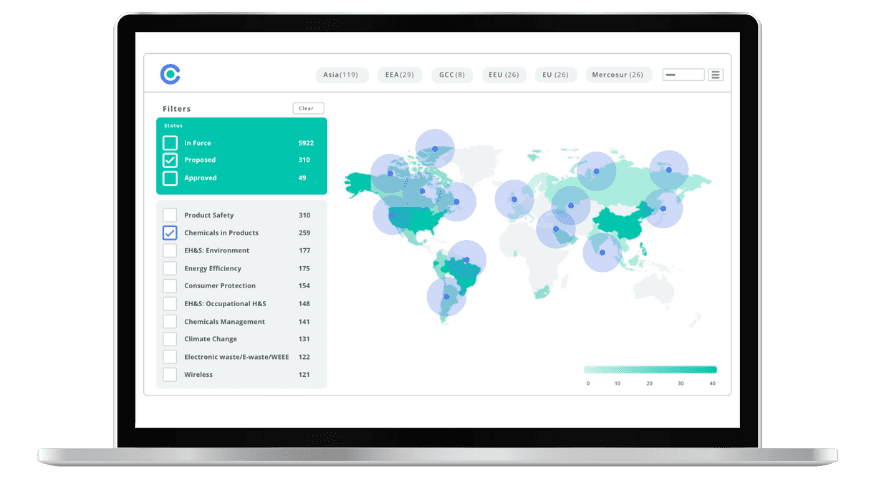
Green Horizons: Product & Sustainability Developments in Latin America

This blog was originally posted on 5th November, 2025. Further regulatory developments may have occurred after publication. To keep up-to-date with the latest compliance news, sign up to our newsletter.
AUTHORED BY CECÍLIA FERREIRA DE CARVALHO, REGULATORY COMPLIANCE SPECIALIST, LUISA TORO CORREA, REGULATORY COMPLIANCE SPECIALIST, COMPLIANCE & RISKS
This overview highlights recent efforts and regulatory developments across several Latin American countries, with a focus on climate action, circular economy initiatives, waste management, data protection, and consumer protection.
If you’re interested in Chemical Compliance in Latin America, check out our recent whitepaper!
Is Latin America Entering a New Era of Data and Consumer Protection?
Recent regulatory developments across Latin America, particularly in Mexico and Ecuador, are significantly increasing compliance burdens for data protection. Meanwhile, Argentina and Panama are taking steps to strengthen consumer rights, particularly in e-commerce and product warranties.
Stricter Data Protection and Consumer Law Updates
Mexico is advancing amendments to its Law on the Protection of Personal Data held by Private Parties, proposing stricter penalties for non-compliance, including fines and potential imprisonment for failure to report data breaches. Specific safeguards for minors are also being considered, such as requiring parental consent, limiting data collection, and restricting profiling or processing of sensitive data. Alongside these changes, proposed updates to the Consumer Protection Law aim to strengthen data privacy, regulate commercial harassment, prohibit discriminatory pricing practices, require access to personal data, and extend obligations regarding spare parts and accurate product labeling.
Mandatory Data Management and Data Protection Delegates
Concurrently, Ecuador’s recent resolutions establish mandatory procedures for pseudonymization, anonymization, blocking, suspension, and deletion of personal data, along with clear guidelines for exercising data rights. A separate regulation formalizes the role of Data Protection Delegates, requiring their appointment across public and designated private sectors, ensuring independence, and creating a framework for professional training and Superintendency for the Protection of Personal Data (SPDP) registration.
Enhanced Consumer Rights in Argentina, Panama, and Paraguay
Argentina enhanced Consumer Rights for E-commerce and Warranties. Argentine suppliers engaging in distance contracts and e-commerce must immediately update their platforms to include a clearly visible “regret button” that allows consumers to easily exercise their right of withdrawal. Suppliers must also implement a “Service Unsubscribe Button” for easy service cancellation and must notify the consumer of the request’s identification or registration code within 24 hours. Separately, a proposed amendment to the Consumer Protection Law aims to standardize guarantee certificates, requiring them to be in the national language and legible. Notably, it proposes that a purchase invoice alone can validate the guarantee.
Panama is considering amendments to strengthen warranty enforcement, mandate that suppliers handle claims directly, and impose stricter obligations for vehicle recalls, including mandatory public notifications and prompt repairs at no cost to consumers.
Paraguay has implemented administrative procedures to streamline consumer complaint handling, establishing timelines and documentation requirements to ensure proper resolution under the Consumer Protection Law.
These developments highlight a regional trend toward stronger consumer rights, tighter personal data protection, and enhanced accountability for businesses across Latin America.
How is Colombia Updating Hazardous Waste Rules and Promoting Sustainability?
Hazardous Waste (RESPEL) and Used Lead-Acid Batteries (BUPA)
Colombia has recently made notable updates to its legislation on hazardous waste, known locally as RESPEL. Hazardous waste is considered a risk to both the environment and human health. The generation of RESPEL occurs across all economic activities that produce goods or services, whether in public or private establishments. Consequently, this is a highly regulated area in the country.
In August, the Colombian Ministry of Environment and Sustainable Development issued Resolution No. 799, establishing guidelines for the collection and management of used lead-acid batteries (BUPA). The resolution regulates the responsibilities of producers, distributors, users, and consumers of lead-acid batteries for motor vehicles with piston starter motors. This regulation will take effect on 1 January 2026. Companies will be required to report on compliance with collection and management indicators.
In parallel, a proposal on the comprehensive management of hazardous waste, issued in February 2025, is still awaiting approval. This initiative seeks to amend Decree No. 1076 of 2015, integrating principles and guidelines from the Basel Convention. The proposed changes aim to update classification, handling, transportation, and disposal guidelines, as well as to promote environmental safety and producer responsibility. If approved, companies will face new obligations, including enhanced labeling, reporting, and treatment standards.
Advancing Renewable Energy: LASolar and LAEólica
In another step toward energy transition, Colombia has launched LASolar, an optimized environmental licensing framework for solar projects between 10 and 100 MW. Decree No. 1033 streamlines licensing processes, strengthens legal certainty, and ensures direct social benefits for local communities. LASolar supports Colombia’s path to carbon neutrality, safeguards ecosystems, and ensures a fair, inclusive energy transition rooted in environmental justice.
Similarly, Colombia is advancing wind energy projects, with a focus on innovative regulation through the Wind Environmental License (LAEólica) to ensure sustainable and socially responsible development.
Proposed Mandatory Human Rights Framework for Companies
Alongside these initiatives, the Colombian Congress is reviewing a comprehensive proposal to establish a mandatory Human Rights Framework for companies. Introduced by 28 members of Congress, the draft law seeks to hold companies legally accountable for human rights violations.
The proposal was symbolically presented at Plaza de Bolívar, where a crack was depicted across the Capitol steps, highlighting the impact of business activities on vulnerable communities. If enacted, the law would require companies to actively respect human rights and ensure accountability when violations occur, marking a critical debate for Colombia’s future in business, governance, and social justice.
Want to learn about Emerging Human Rights Due Diligence Regulations Across the Globe? Watch our webinar-on-demand!
What is the Brazilian Sustainable Taxonomy (TSB) and How Will it Be Implemented?
Approval and Scope of the TSB
Following a period of public consultation on the preliminary proposals, Brazil has officially approved the final version of the Brazilian Sustainable Taxonomy (TSB). The approval was confirmed during the eighth meeting of the Interinstitutional Committee of the Brazilian Sustainable Taxonomy (CITSB), held in Brasília on August 25.
The TSB’s first edition consists of eight sectoral technical notebooks, two thematic notebooks, and one safeguards and annex volume, totaling 880 pages. The taxonomy covers eight key sectors, aligned with Brazil’s National Classification of Economic Activities (CNAE): Agriculture, livestock, forest protection, fisheries, and aquaculture; extractive industries; manufacturing industries; electricity and gas, water, sanitation, waste management, and decontamination; construction; transport, storage, and postal services; and services, including tourism, urban planning, and information and communication technologies.
The official publication of the technical notebooks is expected soon, following a final review. Implementation will take place gradually, as financial regulators adapt existing frameworks to the new guidelines.
On the international stage, the TSB will be one of Brazil’s key highlights at COP 30, to be held in November.
The Brazilian Sustainable Taxonomy is designed as a classification system that identifies which economic activities can be considered sustainable. It provides a scientifically grounded and objective reference to define economic activities, assets, and projects that contribute to Brazil’s environmental, economic, and social goals.
The taxonomy’s primary purpose is to establish clear and consistent regulatory principles to guide companies, public institutions, and investors in channeling resources toward activities with a proven positive social and environmental impact.
Purpose and Global Harmonization Goals
At a global level, regulatory harmonization is a strategic priority. The growing number of uncoordinated taxonomies worldwide can create uncertainty and hinder the flow of international capital. By setting shared and transparent criteria, the TSB aims to improve predictability for investors, transparency for companies, and objectivity for regulators in assessing sustainable economic activities.
How are Chile & Mexico Advancing their Circular Textile Strategy?
Chile and Mexico enhanced textile sustainability through policies promoting circular economy and extended producer responsibility.
Chile is Expanding Extended Producer Responsibility (EPR) to Include Textiles
In 2025, Chile has made remarkable progress in advancing its environmental legislation, particularly with the continued rollout of Law No. 20.920, better known as the Recycling and Extended Producer Responsibility Law (Ley REP).
This groundbreaking law is built on the principle of Extended Producer Responsibility (EPR), which requires producers of certain goods to take responsibility for the entire lifecycle of their products, from production to post-consumer waste management. In other words, companies must organize and finance the collection, recycling, and proper disposal of the waste their products generate.
Originally, the law covered six key categories of priority products: tires, packaging, lubricating oils, electrical and electronic equipment, batteries, and newspapers, magazines, and periodicals. But in a major development, textiles were officially added to the list in June 2025, making fashion and apparel producers fully subject to the REP Law’s obligations.
To mark National Environment Day on October 2, Chile unveiled the National Circular Economy Strategy for Textiles 2040, a visionary plan to reshape how the country designs, produces, consumes, and manages textiles.
Beyond environmental impact, this initiative aims to cut greenhouse gas emissions, empower local industries, and drive innovation in Chile’s fashion and textile sectors.
Globally, the textile industry is one of the most resource-intensive and polluting sectors. It consumes vast quantities of water and emits more greenhouse gases than international shipping and aviation combined.
By integrating textiles into the REP Law and launching a clear long-term strategy, Chile positions itself as a regional leader in sustainable fashion, moving decisively toward a more responsible, circular, and inclusive future.
Continuing these efforts and as highlighted in our last blog, the Chilean Council of Ministers for Sustainability and Climate Change approved the decree setting collection and recovery targets for batteries and electrical and electronic devices, including photovoltaic panels and temperature exchange appliances, in June 2025.
Following approval, the decree was sent to the President of the Republic for signature and subsequently to the Comptroller General’s Office for review. As of October 2025, the decree is still pending publication in the Official Gazette. Once published, a two-year period is expected before the first year of target compliance begins, allowing all stakeholders time to prepare for proper implementation.
Proposed Sustainability and Traceability Labeling in Mexico
Meanwhile, Mexico is taking significant steps toward creating a more sustainable fashion industry with new legislative proposals aimed at increasing transparency and reducing environmental impact. In October 2025, the Senate introduced a Draft Decree to establish sustainability and traceability labeling for textiles, footwear, clothing, and accessories. This helps consumers make informed choices based on garments’ water and carbon footprints while encouraging reuse, repair, and recycling.
The proposal amends the Waste Management, Environmental Protection, and Consumer Protection Acts to establish a national textile sustainability policy focused on responsible waste management, sustainable production and consumption, and consumer transparency. It would also require manufacturers and distributors to register waste management plans and direct the Consumer Protection Agency to develop new Mexican Official Standards (NOM) for sustainability labeling. This builds on an earlier initiative from August 2025, which proposed classifying textile waste as special management waste and obligating producers and retailers to develop management protocols that support a circular economy. Together, these measures reflect Mexico’s growing commitment to environmental accountability and a more sustainable textile future.
How are the Dominican Republic, Mexico & Peru Strengthening Regulations on Circular Economy and Waste Management?
Regional Focus on E-Waste (WEEE) Management
The Dominican Republic, Mexico, and Peru are strengthening regulations for e-waste and hazardous materials, boosting recycling, recovery, and circular economy efforts. Their new laws and rules clearly define responsibilities and follow international standards.
Proposed WEEE Regulations in Mexico and the Dominican Republic
In Mexico, a draft amendment to the General Law for the Prevention and Management of Waste proposes updates to important articles to support the dismantling, recycling, and recovery of materials from WEEE, including establishing dedicated recycling centers and defining responsibilities for both generators and service providers.
Likewise, in the Dominican Republic, a Draft Law focuses on extended producer responsibility, requiring producers and importers to create and fund systems for collecting, disassembling, and recycling WEEE, providing consumer information on takeback and disposal options, and ensuring proper management through authorized companies, with oversight from the Ministry of Environment and adherence to international standards like the Basel Convention. Both initiatives, which will take effect upon publication in the Official Gazette, demonstrate a growing regional commitment to sustainable electronic waste management.
New Regulations for PCBs, Solid Waste Reform, and Pending WEEE Management for Peru
In Peru, Decree Nº 018-2025-SA, published in September, approved the Technical Regulations for the Sanitary and Environmental Management of Polychlorinated Biphenyls (PCBs). This decree establishes strict rules for the identification, handling, and eventual destruction of PCB-contaminated equipment and waste. It provides a framework for the safe and environmentally responsible management of all equipment and waste containing PCBs.
The Ministry of Health, through its Environmental Health Directorate (DIGESA), will oversee occupational health standards related to PCB exposure. Meanwhile, the Ministry of Environment will manage the national PCB database and report progress internationally. Violations of the regulations may result in warnings, fines, or, in severe cases, the cancellation of operating licenses.
In parallel, the country has initiated a consultation on a Draft Decree to reform its Solid Waste Management Law (SWML), originally enacted under Legislative Decree No. 1278. The proposed changes aim to strengthen coordination between the three levels of government and private sector actors, promoting an efficient, integrated, and transparent solid waste management system. Updated technical and operational guidelines align with the new responsibilities established under Law No. 32212, with the goal of ensuring sustainable and comprehensive waste management nationwide.
Similarly, a proposal for a new regulation establishing a Special Regime for the Management and Handling of WEEE (Waste Electrical and Electronic Equipment), issued in April 2025, is still pending approval. This regulation aims to create a broad legislative framework covering eleven categories of electrical and electronic equipment, clarifying the responsibilities of manufacturers, importers, municipalities, recycling companies, and the public. If approved, companies can expect stricter obligations, including mandatory registration in the National Registry of EEE Producers and detailed reporting requirements.
The consultation period for both initiatives has concluded, and while no further updates have been released, approval is anticipated in due course.
Is Mexico Redefining Water and Environmental Accountability for a New Era?
Revising Water Rights and Concessionaire Obligations
Mexico is ushering in a significant shift in water and environmental regulation, demanding urgent attention from concessionaires and operating companies. SEMARNAT has introduced important measures, including non-expiration guarantee fees for unused water (Communication No. 349-B-141) and streamlined, digitalised procedures for modifying concessions, environmental impact assessments, and forest land-use permits. Starting October 8, 2025, many processes will shift to a Single Digital Window, which will require secure electronic submissions.
Legislative reforms are redefining water as a human right and a public good, rather than a commodity. Draft amendments to the National Water Law and the proposed General Water Law introduce “hydric responsibility,” prioritize domestic use, and mandate water recycling, reuse, and rainwater harvesting for large projects. The reforms also eliminate private transfers of water rights and impose stricter obligations on concessionaires, including compliance with NOMs and reporting on water use and discharges, while ensuring affected communities are fully informed and consulted.
Increased Environmental Liability and Penalties
Environmental liability is also increasing. Proposed changes link penalties to the Unit of Measurement and Update (UMA), significantly raising maximum fines, and eliminate the statute of limitations, creating ongoing risk for environmental damage. Authorities may also carry out urgent restoration measures without delay.
Collectively, these reforms reflect Mexico’s commitment to sustainable and fair water management, increased environmental accountability, and the incorporation of human rights principles into law. Businesses must act now to review compliance requirements, implement responsible water practices, and ensure sustainable operations within the new regulatory framework.
Can New Climate Laws in the Dominican Republic and Ecuador Raise the Bar for Action?
Establishing New Climate Institutions and Governance
The Dominican Republic is moving to strengthen its climate framework with Draft Laws 1030/2025 and 1032/2025. The first creates the National Institute on Climate Change and the National Climate Fund to coordinate policies, finance mitigation projects, and oversee emissions reporting, with strict fines for non-compliance. The second addresses climate governance, risk assessments, adaptation measures, and public awareness, with a focus on protecting vulnerable communities. Both bills align with the Paris Agreement and will become effective upon publication.
Mandatory Climate Data Reporting (RNCC)
In Ecuador, the National Climate Change Registry (RNCC) now mandates that public, private, and mixed entities report climate data through a standardized system. This ensures robust measurement, reporting, and verification of mitigation, adaptation, and loss-and-damage activities, while promoting transparency, data quality, and attention to gender and priority groups.
Experience the Future of ESG Compliance
The Compliance & Risks Sustainability Platform is available now with a 30-day free trial. Experience firsthand how AI-driven, human-verified intelligence transforms regulatory complexity into strategic clarity.
👉 Start your free trial today and see how your team can lead the future of ESG compliance.
The future of compliance is predictive, verifiable, and strategic. The only question is: Will you be leading it, or catching up to it?

Simplify Corporate Sustainability Compliance
Six months of research, done in 60 seconds. Cut through ESG chaos and act with clarity. Try C&R Sustainability Free.



